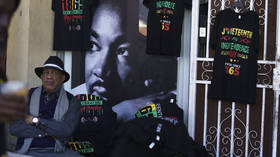Merchandise triggers racial controversy in US

With ‘Juneteenth’ now a federal holiday, US retailers have used the opportunity to hawk products marking black freedom. However, activists say that some of these products miss the mark, while others are racially offensive.
President Joe Biden officially recognized June 19 – Juneteenth – as a federal holiday last year. Once a regional celebration unique to Texas, the date has been recognized in some capacity by 46 states since the 1980s, and commemorates the day – June 19, 1865 – that the last black slaves in the south learned of their freedom after the Civil War. Biden’s 2021 announcement came hours after the US Supreme Court rejected a lawsuit filed by former slaves in Africa against food giant Nestle.
While nearly three-quarters of black Americans support the holiday, only 45% of Hispanics and 38% of whites are on board, a Gallup poll found last month. A survey last year found that only 7% of Republican voters supported making Juneteenth a national holiday, compared to 57% of Democrats.
With Dollar Tree selling gray, green and red ‘Juneteenth 1865’ tank tops and T-shirts, and JCPenney offering wall hangings featuring abstract graphic designs and silhouettes of black women, a ‘diversity, equity and inclusion’ consultant told Reuters that these retailers should use the holiday to promote black-owned vendors instead.
Celebrating Juneteenth is more complex than “putting a Black Power fist on something,” PR agency director Brian Packer said.
Some corporate attempts to honor the holiday have publicly backfired. Walmart offered trademarked “Juneteenth Ice Cream” earlier this summer, prompting social media users to accuse the company of attempting to profit off black history. Despite the fact that the Juneteenth trademark was actually owned by a black professor in Pennsylvania, Walmart pulled the ice cream from its stores and apologized for causing “concern for some of our customers.”
“What’s wrong babe? You’ve hardly touched your Walmart Great Value celebration edition Juneteenth ice cream.” pic.twitter.com/T3hQaPDmSd
— Tom Foolery (@zach_minyard) June 18, 2022
Walmart marked ‘Pride Month’ similarly by selling “Pride Ice Cream.” Although the brownie and cherry flavored treat was the subject of some mockery online, it didn’t generate the same controversy as the Juneteenth dessert, and according to some Twitter users, “the gay flavored ice cream… is pretty tasty.”
Other Juneteenth-related promotions have been written off as outright racist. The Children’s Museum of Indianapolis apologized last week for offering a “Juneteenth Watermelon Salad,” and pledged to review its labeling more thoroughly in future.
A local teacher told CNN that “people were very offended” when they saw the salad in the museum’s cafeteria. “So y’all decided ‘hey let’s celebrate by perpetuating offensive stereotypes,’” one Facebook user commented on a photo of the salad. “Y’all really thought this was a good idea?”
The museum wasn’t the first organization accused of stereotyping black people on Juneteenth. A group of IKEA employees walked off the job in Atlanta, Georgia last year when the Swedish furniture giant served fried chicken and watermelon as part of a “special menu” designed to “honor the perseverance of Black Americans and acknowledge the progress yet to be made.”
The company later said that the menu was created “with the best of intentions,” and was actually drawn up based on “recommendations from black co-workers.”
Amid the corporate cash-in, some black social media users have asked for support more directly in recent years – by soliciting cash payments as “reparations.” Reporters following the story were apparently unable to distinguish whether the campaign was satirical or real.












